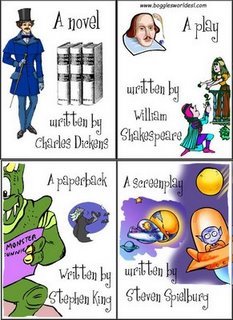 ll
ll- Voz activa: John writes the letter
- Voz pasiva: The letter is written by Tom
- Voz activa: John is writing the letter
- Voz pasiva: The letter is being written by Tom
- Voz activa: John wrote the letter
- Voz pasiva: The letter was written by Tom
- Voz activa: John was writing the letter
- Voz pasiva: The letter was being written by Tom
- Voz activa: John has written the letter
- Voz pasiva: The letter has been written by Tom
- Voz activa: John had written the letter
- Voz pasiva: The letter had been written by Tom
- Voz activa: John will write the letter
- Voz pasiva: The letter will be written by Tom
- Voz activa: John is going to write the letter
- Voz pasiva: The letter is going to be written by Tom
- Active and Passive Voic e
- Go to Gramar >>>
- We focus the action of the verb in the subject (active voice) or object (passive voice).
- Examples:
- Active Voice: The Porter Carries the bags. = The porter carries bags
- Passive Voice: The bags are Carried by the porter. = Bags are taken by the goalkeeper
- grammar rules
- The passive voice is formed by using the verb to be + main verb participle (past participle)
- To change an active sentence to passive we consider the following points:
- The object of the active sentence becomes the subject of the passive
- The main verb is replaced by the auxiliary "to be" at the same time along the main verb participle.
- The main subject of the sentence becomes the passive agent complement
- If we mention in prayer the subject performing the action (subject agent), it will normally introduced by the preposition by.
- Table of changes in transforming verbal Active Voice to Passive Voice
- Taking into account the above points, in this scheme we see the changes undergone by the tense of an active sentence to be turned to passive sentence.
- time
- Active phrase
- passive sentence
- I write to present letter The letter is written
- present continuous'm writing a letter is being written The letter
- I wrote a letter past The letter was written
- past continuous I was writing a letter The letter was being written
- I've written to present perfect letter has been written The letter
- past perfect letter I had written a letter had been written The
- future I will write a letter The letter will be written
- Future II I'm going to write a letter The letter is going to be written
- modals I have to write a letter The letter has to be written
- modals i should write a letter The letter Should be written
- I must write to modals letter The letter must be written
Taking into account the above points, in this scheme we see the changes undergone by the tense of an active sentence to be turned to passive sentence.
time
Active phrase
passive sentence
I write to present letter The letter is written
present continuous'm writing a letter is being written The letter
I wrote a letter past The letter was written
past continuous I was writing a letter The letter was being written
I've written to present perfect letter has been written The letter
past perfect letter I had written a letter had been written The
future I will write a letter The letter will be written
Future II I'm going to write a letter The letter is going to be written
modals I have to write a letter The letter has to be written
modals i should write a letter The letter Should be written
I must write to modals letter The letter must be written
Related posts:

1. Present past
2.2. Present continuo
2.3. Past present
2.4. Past continuo
2.5. Presente perfecto
2.6. Past perfect
2.7. Future will
2.8. Future (going to)

he passive voice in English is formed with the verb 'to be' plus the past participle.
Ex: I was invited to her birthday party.
The complement of the active sentence becomes the passive subject. To say who did the action in the passive voice is used 'by'
Ex: This cake was made by my mother
Passive verb forms
Present simple: am / are / is + past participle ... Italian is spoken here
Present continuous: am / are / is being + past participle ... Your hair is being brushed
Future: will be + past participle ... Exams will be corrected by next week
Near future: am / are / is going to be + past participle ... You are going to be made redundant next month
Past simple: was / were + past participle ... We were Told to leave the party
Past continuous: was / were being + past participle ... The room was being cleaned When we got back from lunch
Present perfect: have / has been + past participle ... You have been discriminated
Past perfect: had been + past participle ... I had been seen with her sister
 ejenmplos voz pasiva
ejenmplos voz pasiva